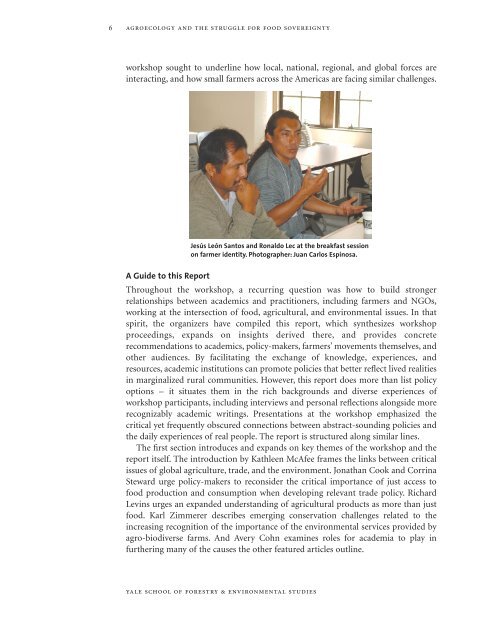Agroecology and the Struggle for Food Sovereignty ... - Yale University
Agroecology and the Struggle for Food Sovereignty ... - Yale University
Agroecology and the Struggle for Food Sovereignty ... - Yale University
Create successful ePaper yourself
Turn your PDF publications into a flip-book with our unique Google optimized e-Paper software.
6<br />
agroecology <strong>and</strong> <strong>the</strong> struggle <strong>for</strong> food sovereignty<br />
workshop sought to underline how local, national, regional, <strong>and</strong> global <strong>for</strong>ces are<br />
interacting, <strong>and</strong> how small farmers across <strong>the</strong> Americas are facing similar challenges.<br />
Jesús León Santos <strong>and</strong> Ronaldo Lec at <strong>the</strong> breakfast session<br />
on farmer identity. Photographer: Juan Carlos Espinosa.<br />
A Guide to this Report<br />
Throughout <strong>the</strong> workshop, a recurring question was how to build stronger<br />
relationships between academics <strong>and</strong> practitioners, including farmers <strong>and</strong> NGOs,<br />
working at <strong>the</strong> intersection of food, agricultural, <strong>and</strong> environmental issues. In that<br />
spirit, <strong>the</strong> organizers have compiled this report, which syn<strong>the</strong>sizes workshop<br />
proceedings, exp<strong>and</strong>s on insights derived <strong>the</strong>re, <strong>and</strong> provides concrete<br />
recommendations to academics, policy-makers, farmers’ movements <strong>the</strong>mselves, <strong>and</strong><br />
o<strong>the</strong>r audiences. By facilitating <strong>the</strong> exchange of knowledge, experiences, <strong>and</strong><br />
resources, academic institutions can promote policies that better reflect lived realities<br />
in marginalized rural communities. However, this report does more than list policy<br />
options – it situates <strong>the</strong>m in <strong>the</strong> rich backgrounds <strong>and</strong> diverse experiences of<br />
workshop participants, including interviews <strong>and</strong> personal reflections alongside more<br />
recognizably academic writings. Presentations at <strong>the</strong> workshop emphasized <strong>the</strong><br />
critical yet frequently obscured connections between abstract-sounding policies <strong>and</strong><br />
<strong>the</strong> daily experiences of real people. The report is structured along similar lines.<br />
The first section introduces <strong>and</strong> exp<strong>and</strong>s on key <strong>the</strong>mes of <strong>the</strong> workshop <strong>and</strong> <strong>the</strong><br />
report itself. The introduction by Kathleen McAfee frames <strong>the</strong> links between critical<br />
issues of global agriculture, trade, <strong>and</strong> <strong>the</strong> environment. Jonathan Cook <strong>and</strong> Corrina<br />
Steward urge policy-makers to reconsider <strong>the</strong> critical importance of just access to<br />
food production <strong>and</strong> consumption when developing relevant trade policy. Richard<br />
Levins urges an exp<strong>and</strong>ed underst<strong>and</strong>ing of agricultural products as more than just<br />
food. Karl Zimmerer describes emerging conservation challenges related to <strong>the</strong><br />
increasing recognition of <strong>the</strong> importance of <strong>the</strong> environmental services provided by<br />
agro-biodiverse farms. And Avery Cohn examines roles <strong>for</strong> academia to play in<br />
fur<strong>the</strong>ring many of <strong>the</strong> causes <strong>the</strong> o<strong>the</strong>r featured articles outline.<br />
yale school of <strong>for</strong>estry & environmental studies

















